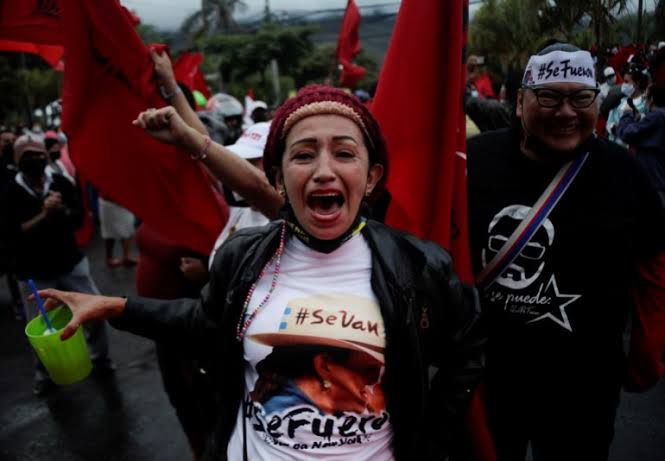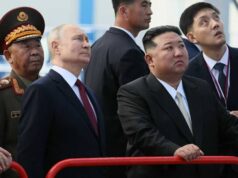US interference sparks new political crisis in Honduras

By Jennifer Hicks
The leftist government of Honduras is currently facing significant challenges following a diplomatic incident with the United States.
Our investigation reveals a sophisticated network of US-government-backed assets, engaged in regime change activities, which is orchestrating attacks against the Castro administration.
These efforts are employing lawfare tactics aimed at generating scandals in the lead-up to the pivotal elections scheduled for next year in Tegucigalpa.
The Honduran government has openly accused the US of attempting to instigate a “coup d’état” after the media outlet Insight Crime released footage from a decade ago.
This footage allegedly shows the brother-in-law of President Xiomara Castro negotiating a payment with individuals who later confessed to being involved in drug trafficking.
The leak of this tape came amid escalating tensions with the US over Honduras’ increasingly friendly relations with Venezuela, following the controversial elections in July.
In a striking move, President Castro recently announced an end to a long-standing extradition agreement with the US, emphasizing her intention to protect the Honduran Armed Forces from being used as pawns in political games.
“I will not allow the instrument of extradition to be used to intimidate or blackmail the Honduran Armed Forces,” Castro stated. This announcement, coupled with the timing of the tape’s release, has led many of her supporters to conclude that the US is behind the recent media frenzy.
Legacy media outlets framed Castro’s announcement as a sign of corruption, with headlines suggesting that she might be entangled in the very narco-corruption she vowed to eradicate.
However, an investigation by The Grayzone indicates that the individuals at the center of this diplomatic conflict have direct ties to the US government, including Insight Crime, which has received funding from the State Department.
The investigation suggests that the release of the tape was a strategic maneuver aimed at curbing the increasingly independent stance of the Castro administration.
The video, allegedly recorded in 2013 by a narco-trafficker who was cooperating with the Drug Enforcement Administration (DEA), was leaked to the public at a critical moment.
This was shortly after a meeting between military leaders from Venezuela and Honduras prompted the US ambassador to publicly accuse a Honduran official of associating with a known drug dealer.
Carlos Zelaya, the individual in question, has denied any wrongdoing, asserting he was unaware of the individuals’ backgrounds. He has stepped down from his congressional position pending an investigation.
Within the Castro administration, the ambassador’s remarks were perceived as a deliberate threat, foreshadowing what could be a color revolution-style regime change effort.
The timing of the video leak has raised suspicions, as the administration believes Insight Crime has possessed it since at least 2022.
Xiomara Castro’s election in 2021 marked a significant shift towards social democracy, following a prolonged period characterized by what many Hondurans referred to as a “narco-dictatorship.”
This dark chapter was initiated by a US-backed coup in 2009, which ousted Castro’s husband, Manuel Zelaya, from the presidency.
In June 2024, the former president, Juan Orlando Hernandez-an emblematic figure of this narco-dictatorship-was sentenced to 45 years in a New York federal prison.
Notably, the US had long shielded Hernandez from scrutiny, ignoring his own admission of involvement in drug trafficking.
While it seemed that the US was initially willing to coexist with the new administration, the recent developments indicate a shift toward aggression against the Castro government.
Carlos Estrada, an advisor to President Castro specializing in international relations, expressed concern about the timing of the ambassador’s remarks coinciding with the video’s leak.
“It is very clear that the words of the ambassador coincided with the moment in which this video was going to be leaked,” he stated. Estrada emphasized that the objective is “destabilization.”
He added that the Castro administration decided to terminate the extradition treaty with the US after what he described as a “highly irresponsible and highly anti-diplomatic comment” from the US ambassador regarding a routine visit between the Honduran and Venezuelan defense ministers.
This situation raised alarms within the government, as they viewed the ambassador’s comments as an attempt to widen the scope of lawfare against key leaders, including President Castro and former President Zelaya.
Estrada warned that further challenges are on the horizon, noting that the media attacks coincide with operations being conducted in Honduras by opposition factions with connections to drug cartels.
He pointed out that US efforts to regain control over an increasingly independent Honduras began well before this diplomatic incident.
A telling sign was the nomination of Laura Dogu as the US ambassador to Honduras. Her previous role as ambassador to Nicaragua involved overseeing a violent coup in 2018 that resulted in numerous deaths, highlighting her contentious background.
“The logic behind the leaking of the video has to do with a way of neutralizing actors,” Estrada noted, highlighting that Dogu’s appointment was part of a broader strategy to disrupt the political landscape in Honduras.
He criticized her aggressive oversight of the Castro administration, stating that her interventions began shortly after her appointment, where she publicly challenged the government’s energy reforms.
Dogu’s recent actions to undermine the Castro administration were amplified by Insight Crime, which disseminated the leaked tape of Carlos Zelaya.
Questions arise regarding how the outlet obtained the footage, given its history of cooperation with US authorities.
The video was originally created by informants for the DEA, who later provided it to the agency in a deal that secured their freedom from prosecution.
Despite having sat on the tape for years, Insight Crime managed to obtain it and publish it, raising suspicions about its intentions.
Since its establishment in 2010 with funding from various sources, including the Open Society Foundations, Insight Crime has gained notoriety for targeting Latin American governments that have fallen out of favor with Washington.
The outlet has received over a million dollars in grants from the US State Department since 2022, raising questions about its independence.
Insight Crime’s leadership has a history of collaboration with US intelligence agencies, creating a narrative that suggests it may serve as a vehicle for US interests.
The organization itself has admitted to maintaining relationships with criminal actors, suggesting a complex web of information gathering that could be manipulated for political ends.
The Grayzone reached out to Insight Crime for comments on its connections to the State Department, but received no response.In the wake of the Zelaya tape’s release, the political landscape in Honduras has polarized.
While the ruling Libre Party has largely united in support of President Castro, opposition factions are demanding her resignation.
However, Steven Dudley, co-founder of Insight Crime, suggested that securing a conviction against Zelaya would be challenging both legally and politically, casting doubt on the substance of the allegations.
Despite Dudley’s acknowledgment of the difficulties in proving wrongdoing, the release of the video has had a palpable impact on the political discourse.
“The video generates a type of impact that is distinct from other forms of evidence,” Dudley noted, implying that its mere existence serves to tarnish the reputation of the Libre Party and the Castro administration.
Carlos Estrada pointed out that the ultimate goal of this operation is to portray the Libre Party as complicit in the corruption that plagued previous administrations.
He argued that the current government is making significant strides in rescuing the country from its tumultuous past, which threatens the interests of the Honduran elite.
In this context, various groups, such as the National Anti-Corruption Council (CNA), have emerged as potential adversaries to the Castro administration.
Led by Gabriela Castellanos, the CNA has called for Castro’s resignation, a move criticized by the government for being hypocritical, given the council’s previous inaction during the Hernandez administration.
Estrada argued that the CNA has never genuinely challenged the corruption of the narco-dictatorship, and its call for Castro’s resignation serves as a continuation of the political games played by the elite to maintain their grip on power.
As the situation continues to evolve, the struggle between the current Honduran government and powerful external forces is likely to shape the country’s political future in the coming months, as tensions rise and new challenges emerge.




